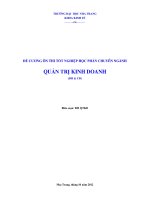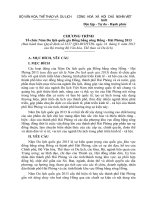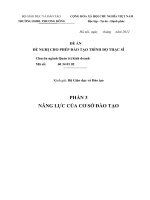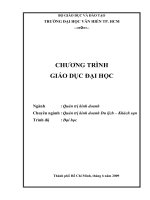tiếng anh chuyên ngành quản trị kinh doanh English8
Bạn đang xem bản rút gọn của tài liệu. Xem và tải ngay bản đầy đủ của tài liệu tại đây (247.99 KB, 7 trang )
Unit 3: Mixed economies
………………………………………………………………………………………………
………………………………………………………………………………………………
5. The employers have prepared a special scheme. This scheme must be approved by the
government.
………………………………………………………………………………………………
………………………………………………………………………………………………
Exercise 3
In each of these sentences a word is missing. Provide a word in the text, between lines 4 and
14.
1. The USSR is a _______ of communism.
2. The Americans are _________ to a system of private enterprise.
3. To control an economy is much the same as to ________ it.
4. The work was carefully __________ by the authorities for five years.
5. It is necessary to make a sharp __________ between planned and unplanned
economies.
6. He does not work in this ___________ of the economy but in the public one.
7. A mixed economy possesses some of the qualities of the two main ________ of
economic system.
8. Coal, steel and farming are important national _________.
9. The __________ of the workers were happy about the new plan, but a small number
were not.
10. Some industrial ___________ , like BP and ICI, are international as well as national in
their activities.
4. LISTENING: Transportation
Nigel Storke đang nói chguyện với Kenvin Hughes ở Transworld về hàng hoá được gửi
vận chuyển từ Beeton tới Norton.
(Nigel Storke is talking to Kevin Hughes at Transworld about transporting a consignment
from Beeton to Norton.)
Exercise 1: Listening comprehension
69
Unit 3: Mixed economies
Listen to the disc and decide which letter represents which town. Then mark the statements
below true (T) or false (F).
Exercise 2: Dimensions
Write these dimensions (measurement) in full as you say them and give the area or
volume, like this:
23 x 12m: Twenty-three by twelve. That’s two hundred and seventy - six square metres.
9.5 x 2 x 5cm: Nine point five by two by five. That’s ninety - five cubic centimetres .
1. 16 x 5cm
5. 1.1 x 5k
2. 30 x 2,5 x 1m
6. 60 x 12 x 10cm
3. 20 x 4 x30cm
7 . 7 x 1 x 1k
4. 19 x 0,1m
8.
20 x 2k
Laboratory drill
P: Number one
70
R: Sixteen by five centimetres
Unit 3: Mixed economies
Exercise 3: Used to do
Talk about things in the past which are not true now, like this:
P: There isn’t an airport at Ayton nowadays.
R: Did there use to be an airport at Ayton then?
P: There used to be, but there isn’t any more.
P: She has only worked for GLM since the takeover.
R: Didn’t she use to work for GLM then?
P: She didn’t use to, but she does now.
1. They don’t handle dangerous cargo since the accident.
2. Transworld send containerised goods nowadays.
3. There isn’t a railway line between Dutton and Norton any more.
4. He doesn’t export to Italy now.
5. Transworld arrange airfreight consignments these days.
6. They make stereo equipment since they expanded.
Laboratory drill
P: There isn’t an airport at Ayton nowadays
R: Did there use to be an airport
at Ayton then?
Exercise 4: Comparing
This table shows the comparative speed and cost of sending a consignment of cloth from
London to Madrid.
MEANS OF
TRANSIT
FREQUENCY OF
DEPARTURE
TOTAL COST
TRANSPORT
TIME
10 days
Every 12 days
246
1 day
Every day
433
4 days
Every 5 days
149
3 days
Every 7 days
145
Compare the different means of sending the consignment, like this:
P: Is it quicker by sea than by air?
R: No. It’s slower.
P: Are trains more frequent than trailers?
R: No. They’re less frequent.
P: Is it more expensive by train than by plane?
R: No. It’s less expensive.
71
Unit 3: Mixed economies
Laboratory drill
P: Is it quicker by sea than by air?
R: No. It’s slower.
Exercise 5: Reported speech and used to do
John’s out - of - date knowledge. Now you do like this:
P: John said there was an airport at Dutton.
R: He’s wrong then. There used to be an airport at Dutton, but there isn’t now.
P: John said she didn’t work for BOS.
R: He’s wrong then. She didn’t use work for BOS, but she does now.
Laboratory drill A
P: John said there was an airport at Dutton.
R: There used to be an airport at Dutton, but there isn’t now.
P: John said she didn’t work for BOS.
R: She didn’t use to work for BOS, but she does now.
Laboratory drill B
P: I think there’s an airport at Dutton. R: Yes, John said there was an airport at Dutton.
P: I don’t think she works for BOS
R: Yes, John said she didn’t work for BOS.
SUMMARY
Trong bài số 3 bạn đã học và ôn lại các phần sau:
-
Từ vựng liên quan đến các nền kinh tế hỗn hợp.
-
Cách tạo từ mới bằng cách thêm hậu tố.
-
Cách sử dụng cấu trúc Used to
-
Ôn lại cách sử dụng câu gián tiếp (Reported speech)
-
Ôn tiếp cấu trúc so sánh
VOCABULARY
BOAC: British Overseas Airways n
Corporation
hãng hàng không của Anh
BP: British Petroleum
ngành công nghiệp dầu lửa của Anh
72
n
Unit 3: Mixed economies
British Rail
n
ngành đường sắt của Anh
cargo
n
hàng chuyên chở
charge by volume
n
cước phí tính theo thể tích
charge by weight
n
cước phí tính theo trọng lượng
classify
v
phân loại
consignment
n
hàng hoá được gửi vận chuyển
container
n
công-ten-nơ
containerisation
n
việc đóng hàng vào công-ten-nơ
conventional cargo
n
hàng chuyên chở thông thường
eminent industrialist
n
nhà công nghiệp nổi tiếng
freight rate
n
giá cước hàng hoá chuyên chở
giant
adj
lớn
ICI: Imperial Chemical Industries.
n
các ngành công nghiệp hoá học
inevitably
adv
tất nhiên, không thể tránh được
long-term
adj
dài hạn
make a distinction
v
phân biệt
NEDC:
National
Development Council
Economic n
Hội đồng phát triển kinh tế quốc gia
private sector
n
thành phần kinh tế tư nhân
public sector
n
thành phần kinh tế nhà nước
trailer
n
xe tải, xe móoc
under-developed country
n
nước chưa phát triển
volume
n
khối lượng
joiner
n
người liên kết, thợ mộc, hội viên
juggler
n
người chơi trò tung hứng
productive
adj
CONSOLIDATION EXERCISES
Exercise 1: The table show how words are formed around the verb produce. List all the
words you can make from the table and use them in suitable blanks in the sentences.
73
Unit 3: Mixed economies
produc
e
r
t
iv (e)
ity
ion
1.
The company……………..a new commodity every year.
2. The company’s newest ………………………is a special blue soap powder.
3. The ………………..of soap powders met last year to discuss prices.
4. That factory is not as………………….now as it was five years ago.
5. The …………………..of that factory has gone down over the last five years.
6. The manager of the factory has decided that they must increase their………………..
of packets of soap powder.
Exercise 2: This table shows how certain nouns can be formed from these adjectives, as for
example activity from active. Make a list of nouns and put each word in its suitable place in the
sentences, the loss of the letter e in active, secure, mobile and productive.
active
equal
secure
complex
mobile
ity
liquid
solid
regular
productive
similar
1. The system was complex. Its ………………………….surprised him.
2. The movements of the products
…………………..surprised him.
in
the
factory
was
rapid.
The
3. People who have cars are very mobile. This…………………is a useful thing.
4. The National Bank has a solid reputation. Its……………….. in money is similar to
the ……………… of its buildings.
74
Unit 3: Mixed economies
5. The national economy, like a man should be active. Its………………...is a sign of its
health.
6. Your money is secure in the National Bank. Its…………………is important both to
you and to the bankers.
7. The workers in those factories are very productive. Their………………is very useful
to the national economy.
8. Those men arrive regularly at nine o’clock. Their ………………well-known.
9. The Americans and British economic systems are very similar. This……………….is
surprising.
10. Those two men earn equal sum of money. They have………………in wages because
they produce the same quantity quality goods.
Exercise 3: Change the listed words and phrases into agent nouns
Example: consume → consume-er = consumer
1.
buy
2.
sell
3.
use
4.
work
5.
bank
6.
mine
7.
produce
8.
organize
9.
manage
10.
begin
11.
breed
12.
perform
13.
a man who breeds casttle
14.
a man who owns a house
15.
a man who pays tax
16.
a man who produces whisky
17.
a man who manages a bank
18.
juggle
19.
join
75









